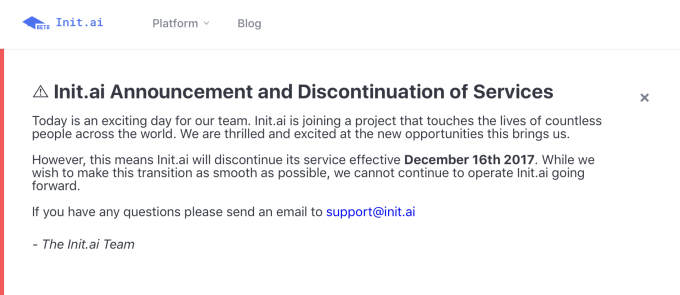Earlier this week, a small startup called Init.ai announced that it soon would be discontinuing its service — a smart assistant for customer representatives to parse and get better insights from their interactions with users, as well as automate some of the interactions — because the team was (according to a notice on the site) “joining a project that touches the lives of countless people across the world.” TechCrunch has now learned what that project is: the team is joining Apple.
They are becoming a part of the group working on Siri, Apple’s own personal assistant that uses voice-based commands and natural language to answer questions, control your phone and more.
To be clear, this is not a straight acquisition, but more of an acqui-hire, so Apple didn’t have a comment to offer along the lines of the one it made last week. Specifically, I understand there is no IP coming over and (typical of Apple) no specific indication of what part of Init’s code or services will be used by Apple, if any.
It’s not known exactly how many of the Init.ai team are joining Apple but the startup was not very big — just six people, according to LinkedIn, including co-founders Keith Brisson, Will Dawoodi, Kyle DeTella and Trevor McNaughton. There may be more than this joining, according to a source.
We first heard of the Apple connection via an anonymous tip, and then were able to corroborate the details with a source close to Init.ai and a second source close to Apple. The noted on init.ai’s site noted that it would stop its services December 16:

Init.ai was based out of New York and founded in 2015, raising an undisclosed amount of funding from six investors according to Crunchbase: Boldstart Ventures, Danmar Capital, Esther Dyson, Jim Young, Techstars and Valence Ventures.
That the team is joining Apple is interesting for a couple of reasons.
One is the fact that Apple is making a lot of moves to build up its artificial intelligence talent at the moment. Prior to this, Apple’s previous three disclosed acquisitions — Regaind, SensoMotoric Instruments and Lattice — were all geared at bringing in more people skilled in the many facets of AI, from machine learning to computer vision. Init brings natural language and machine learning expertise, with a B2C slant, into the mix.
There is a race on for AI talent at the tech companies, and Apple is not prepared to fall behind on it. “AI is now a major internal initiative at Apple,” one source tells us. It’s leading the company to look at every deep learning company, the source added.
The development also potentially raises the question how Siri might develop down the line.
To date, Apple has not launched anything in the way of business integrations with its voice-based assistant, which has largely been focused instead on providing search and simple device-based assistance to its users. (Not a shabby business: There are around 3 billion requests made to Siri each day at the moment, judging by the current growth trajectory.)
But, Apple has started to build bridges for how businesses can better use its other communication tools. Specifically, with iOS 11 the company has launched Business Chat, where users can open iMessage windows in Safari, Maps, Spotlight and Siri (as well as iMessage itself) to initiate conversations with businesses.
Business Chat conversations are not with bots but with humans, and they are not voice-based chats but text-based ones. And that happens to be where Init.ai was building tools, too.
Founded on the premise that we are now living in a “messaging economy” where customers are increasingly interacting with businesses through chats if not in person, Init.ai had built a set of AI-based skills around natural language processing and machine learning, to analyse chat-based conversations between humans.
Listening in real-time, the platform provides suggested responses, prompts for automated responses and also analyses the conversations to provide insights for future customer relations and any further actions to take.
(Note: this is a not uncrowded field. Another interesting startup in the same area but focusing more on voice interactions between customer reps and customers is Gong out of Israel.)
By coincidence, Brisson wrote an essay a year ago about how Apple was putting itself into a complicated situation versus competitors like Amazon, Google and Facebook by not opening Siri more than it has to date.
He also acknowledged that because Apple follows a different philosophy and business model as a company, squaring that circle could prove to be one of its biggest challenges. Could that essay have caught Apple’s eye? (No pun intended.) In any case, it will be interesting to see how and if all this plays out.
